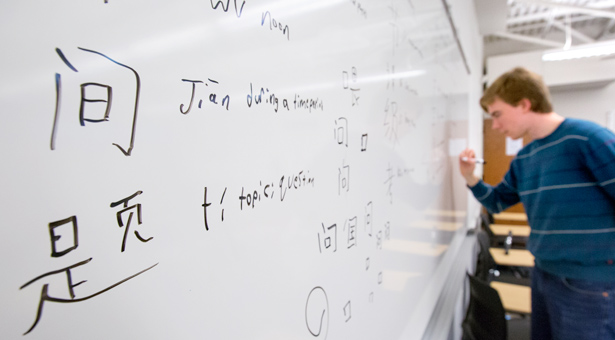The World Acting Globally
New Language Courses Connect Students With Chinese Culture
Dreaming in Mandarin
By Deanna Duff | Photos by Mike Siegel
 Student Sam Hendren practices writing Mandarin Chinese.
Student Sam Hendren practices writing Mandarin Chinese.![]() View more photos
View more photos
Some pictures are worth more than a thousand words. Sophomore Cheryl Hong, a student in Seattle Pacific University’s new Chinese language program, brought to class a family photograph of a Song dynasty poem that had been transcribed by the young woman’s dearly departed grandfather. Instructor Wei Zuo helped her translate the inscription, a celebration of family and humankind.
“Studying and learning this language has helped her enormously to understand her own family, Chinese heritage, and roots,” Zuo says. “It touched my heart to see the difference this class can make.”
In Autumn 2014, SPU offered on-campus Mandarin Chinese courses for the first time in many decades. It is the most recent expansion of the foreign-language curriculum since introducing Spanish in 1989. With its Pacific Rim location, the need for Seattle Pacific to add an Asian language to the curriculum became increasingly clear.
“The Northwest has a large Asian population partially because of Boeing, Microsoft, and Amazon, which have high numbers of Chinese engineers,” Zuo explains. And Washington has been home to Chinese immigrants since the 1850s. “The area’s resources are rich with opportunities and activities.”
Zuo, native to China’s Hunan province, immigrated to Seattle in 2010 and is currently an English PhD candidate at the University of Washington. Her background of language instruction in both China and the U.S. uniquely benefits her development of SPU’s curriculum. Currently, she teaches two sections of first-year Chinese, with a 95 percent student retention rate from Autumn 2014 to Winter Quarter 2015.
“I’m full Chinese, but I don’t know very much about my own culture because I’m third generation. I’d like to learn and maybe write letters to my grandparents,” says Hong, a psychology major.
Students range from sophomores to seniors and represent majors such as international relations, business, and engineering. Some, such as Hong, hope to engage with their own Chinese heritage or better connect with a spouse’s or friend’s culture. Other students aspire to travel or career opportunities.
“This is a step in the right direction for the University,” says SPU senior Ryan Daley. “China is an important player in the global economy.”
Daley, double-majoring in French and in linguistics and cultural studies, finds that his Chinese studies directly apply to other classes. A broader understanding of grammar and language appreciation — the “gorgeous and musical” quality of Chinese — benefits conversations in his linguistics capstone. Daley was so enthusiastic to take Chinese that he delayed his graduation by a quarter.
“I’m hoping within a few years to have thriving second- and third-year, upper-division Chinese courses. Many students have already expressed interest in a Chinese minor if not a major,” says Kathryn Bartholomew, co-chair of SPU’s Languages, Cultures, and Linguistics Department.
Moving forward, Zuo hopes to establish a language-partner program to connect Chinese international students with her foreign language students and encourage friendships as well as speaking proficiency. Also, preliminary discussions with SPU’s business department are exploring how the language program can benefit and prepare students for studying abroad.
“Language is a way of understanding more from inside another culture. It is very much the fulfillment of the mission of SPU, in that the book of Revelation tells us about all peoples, tribes, and languages being represented in heaven,” Bartholomew says.
